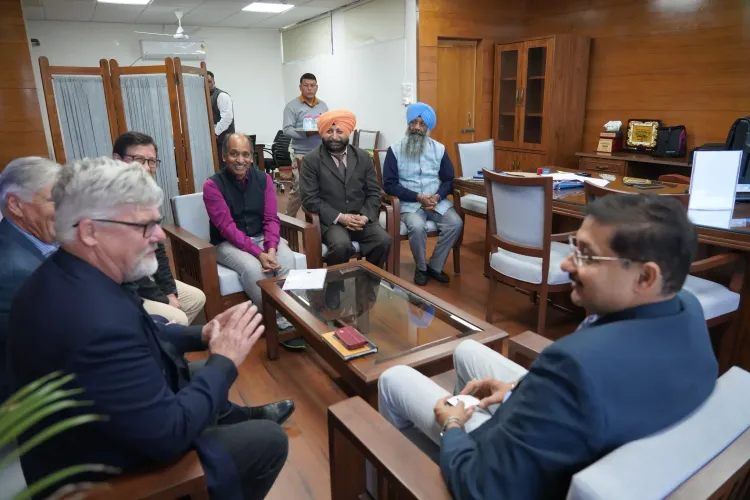New Zealand Team Explores Animal Breeding Projects in Punjab

Synopsis
Key Takeaways
- Collaboration between Punjab and New Zealand in animal husbandry.
- The National Dairy Plan-I focuses on genetic improvement.
- Successful artificial insemination programs in Punjab.
- Importance of high-quality bulls for milk production.
- Engagement with local farmers in project areas.
Chandigarh, Feb 18 (NationPress) A delegation from New Zealand met with Punjab’s Principal Secretary for Animal Husbandry, Rahul Bhandari, on Tuesday to explore opportunities for collaboration in the animal husbandry field, particularly emphasizing animal breeding and small-scale dairy systems.
Bhandari provided an overview of the delegation, which included Prof Garry Udy from the MPI, Prof Nicolas Lopez from Massey University, David Hayman from TRG/ABS, and R.O. Gupta from the National Dairy Development Board. He detailed the active projects under the National Dairy Plan-I, initiated in July 2013.
The project aims to enhance the genetic quality of cattle and buffalo populations through methods such as progeny testing, genetic assessment, and selective breeding.
Core objectives of the initiative include producing high genetic merit bulls for semen stations, developing a solid system for evaluating young bulls, bull dams, and bull sires, while achieving consistent genetic advancements in milk, fat, SNF (solid not fat), and protein production in cattle and buffalo.
Bhandari noted that the project is currently active across 160 institutions in three Punjab districts: Patiala, Sangrur, and Barnala.
Impressive milestones have been reached, including over 450,000 artificial inseminations, the registration of 50,000 female calves, body measurements of 220,000 animals, milk recording, and classification of 6,000 calved daughters, as well as the procurement of 650 high genetic merit male calves.
He also stressed the importance of sourcing high-quality bulls to further improve milk production and quality in the state.
Additionally, the delegation engaged in comprehensive discussions about management practices and visited project villages in Patiala district, such as Chaswal, Saholi, and Laut, to meet local farmers and witness the success of the Murrah Progeny Testing Project.
Accompanied by Dr. G.S. Bedi, the Director of Animal Husbandry, the New Zealand team expressed their satisfaction with the project's operations and achievements in the state.










